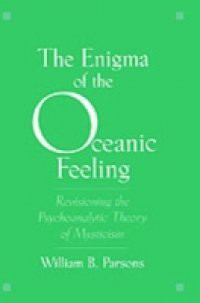This study examines the history of the psychoanalytic theory of mysticism, starting with the seminal correspondence between Freud and Romain Rolland concerning the concept of "oceanic feeling." Providing a corrective to current views which frame psychoanalysis as pathologizing mysticism, Parsons reveals the existence of three models entertained by Freud and Rolland: the classical reductive, ego-adaptive, and transformational (which allows for a transcendent dimension to mysticism). Then, reconstructing Rolland's personal mysticism (the "oceanic feeling") through texts and letters unavailable to Freud, Parsons argues that Freud misinterpreted the oceanic feeling. In offering a fresh interpretation of Rolland's mysticism, Parsons constructs a new dialogical approach for psychoanalytic theory of mysticism which integrates culture studies, developmental perspectives, and the deep epistemological and transcendent claims of the mystics.

